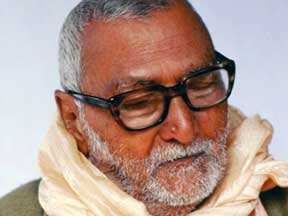 Real selflessness is not shown in the conception of renunciation, which is only mere withdrawal from the negative side. But there is a positive side of divinity: self-giving. And self-giving to the extreme will go to Krishna, the autocrat. He will absorb everything; He is the only enjoyer. Our Guru Maharaj, in his famous poetry wrote, “Dusta mana! Tumi kisera Vaisnava?” “My wicked mind, how can you claim to be a Vaisnava?”
Real selflessness is not shown in the conception of renunciation, which is only mere withdrawal from the negative side. But there is a positive side of divinity: self-giving. And self-giving to the extreme will go to Krishna, the autocrat. He will absorb everything; He is the only enjoyer. Our Guru Maharaj, in his famous poetry wrote, “Dusta mana! Tumi kisera Vaisnava?” “My wicked mind, how can you claim to be a Vaisnava?”
That is the heading of the poem written by our Guru Maharaj, Bhaktisiddhanta Saraswati Thakur. “Oh, my wicked mind, how can you think that you are a Vaisnava proper?” There he has given one line, “Kaminir kama nahe tava dhama, tahara malika kevala yadav:” “The enjoyment, the pleasure, that one gets from the association of ladies should only be desired for Krsna, and no one else.
One gentleman came to enquire, “what do you mean by this expression?”
“But what I mean there is clear.”
The man responded, “Then where is our position?”
“You have no position,” a clear answer.
None are to enjoy but Krsna. That is reserved for Him only. This is the “Krsna conception.” Also in Vaikuntha the tendency to be subservient prevails, although not so much as in Krsna-lila.
We belong to a secondary, subordinate position. We are not owners of potency – we are but a part of the potency. Being constitutionally potency, we have no freedom to enjoy. The master of the potency is to enjoy it, and we are to supply His enjoyment. He is the master while we are many particles of potency, and thus our position is to be enjoyed, to be subservient to the higher. Herein lies our svarupa, our intrinsic identity. We shall be best situated if we can come to such an understanding. In a nutshell, this is Vaisnavism: we are not enjoyers – we are to be enjoyed; we are not positive – we are negative; we are not predominators – we are predominated.
Aham hi sarvva-yajnanam, bhokta ca prabhur eva ca: “I am the enjoyer of everything in this world. All sacrifices are to be performed knowing Me to be the recipient. This is your relationship with Me.”
karyya-karana-kartrtve, hetuh prakrtir ucyateThe action of the body and senses is said to be supplied by prakrti, or material nature (dominated by the conditioned soul). And the soul, although marginal by nature, is said to think himself an enjoyer of happiness or a sufferer of misery, on account of misidentifying himself with mundanity. The pure soul, however, does not conceive himself to be an enjoyer or purusa.
purusah sukha-duhkhanam, bhktrtve hetur ucyate
(Bhagavad-gita, 13.21)
Similarly, in Sankhya philosophy, by the logic known as pangandha-nyaya – wherein a cripple is seated on the shoulders of a blind man and directs the blind man to his desired destination – the purusa (as the conditioned soul) is considered to be crippled and the prakrti (as material nature) is considered to be like a blind man who possesses full energy to move although he cannot guide. Thus, the guide is the purusa, who can see – the guide is consciousness, or intelligence. And the blind energy can move and work. The purusa possesses consciousness, and the feelings of pain and pleasure exist within that consciousness. Yet, his consciousness is inert and passive, and his activity is performed by the agency of another energy. This, in other words, is the conception of a lower plane of activity. Still, consciousness does not evolve from matter as supposed in any theory advocating “fossilism”.
Our Guru Maharaj gave this example: a minor may become the proprietor of an estate, and his managers, taking advantage of his youth, may loot and enjoy his estate. Similarly, the position of the conditioned soul (baddha jiva) is like that of a minor. He cannot control the rebellious managers. He must have the contact of a major soul, and with that help he can subjugate his managers and regain control of his own property.
Thus, a fallen soul’s position is just like that of a minor proprietor in a helpless situation. He is inactive and the managers are conducting all the affairs, but they are usurping everything in the name of the proprietor. The soul is inactive and non-participating. But his managers (body, mind, senses, etc.) are working on his behalf as though supported by him. If his real interest is aroused within his heart by a major soul who is connected with the Supersoul (Paramatma), the Supreme Lord (Bhagavan), the soul will achieve his intrinsic position. He will control the senses and utilize them in the service of the Lord, realizing, “Everything is for Him: everything is for Krsna, not for me.”
![[BVML Home Page]](../grfx/bml_logo.gif)
